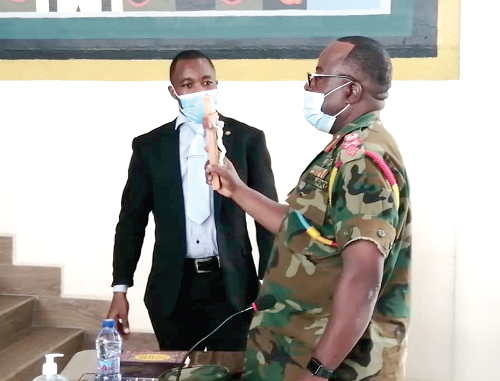
Ejura disturbances enquiry: Our intervention saved situation — Military
The General Officer Commanding (GOC) the Central Command of the Ghana Armed Forces (GAF), Brigadier General Joseph Aphour, has told the Ministerial Committee of Enquiry into the Ejura disturbances that the intervention by soldiers during the protest in the town saved the situation from escalating.
He said but for the intervention of the military, more lives could have been lost, adding that his men did not do anything out of the ordinary but only followed a military standard operating procedure (SOP).
Advertisement
Brig. Gen. Aphour, who was testifying before the committee in Kumasi yesterday, said the military was compelled to use minimum force to control the crowd during the demonstration over the alleged murder of Ibrahim Mohammed, alias Macho Kaaka, a social media activist.
According to him, the soldiers had earlier issued a verbal warning to the irate crowd to retreat but they did not budge, compelling the soldiers to fire warning shots.
He said when the protesters were still surging forward and his men heard gunshots from the crowd, “the military had to return fire to protect themselves”, even though their intention was to shoot to scare the people from advancing.
Brig. Gen. Aphour described the resultant deaths as unfortunate and maintained that if their intention had been to kill, more casualties could have been recorded.
Procedure
Asked whether the men required permission or instructions from senior officers before taking any action, he said the commanders on the ground had been trained and were, therefore, conversant with the rules of engagement and as such took decisions as the situation demanded.
On whether it was appropriate for the military to move in without a strategic Regional Security Council decision, the GOC said there was no time to hold a meeting, adding that if the Regional Minister had not given instruction for the military to move in and restore order, the situation could have been worse.
He said tear gas did not form part of military equipment and so his men were unable to use it to control the crowd.
The Commanding Officer of the Fourth Infantry Battalion, Lieutenant Colonel Kwasi Ware Peprah, also explained that the role of the military was to maintain law and order, and that they only restored order when the situation deteriorated.
According to him, it was possible that the bullets that killed the two persons might not have come from the shots fired by the soldiers.
In his reaction to the video of a soldier seen kneeling and aiming his gun at the crowd, Lt Col Peprah said kneeling to aim was part of warning signals used by the army to persuade an agitated crowd to retreat.
He said even though the casualties were regrettable, the action of the soldiers was inevitable, since it helped calm the situation.
Lt Col Peprah entreated the media to always cross-check their information before going to press, saying a lot of misinformation had been spread by the media about the role of the military in the disturbances, without getting the military’s version of the story.
Police
For his part, the Deputy Ashanti Regional Police Commander, Deputy Commissioner of Police Mr David Agyemang Adjem, told the committee that the presence of the military at Ejura on June 29, 2021 was to scare the protesters to disperse.
He said in the past, whenever the military was called in to assist the police control a crowd, the people often retreated on sighting the soldiers.
Mr Adjem, however, claimed that in the situation at Ejura, the youth did not retreat but surged forward, and that not even warning shots by the military could scare them.



